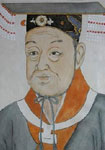
史浩(1106年—1194年),字直翁,号真隐。明州鄞县人,南宋政治家、词人。高宗绍兴十五年(1144年)进士,由温州教授除太学正,升为国子博士。他向宋高宗建议立太子,以此受知于朝廷,绍兴三十二年,宋孝宗即位,授参知政事。隆兴元年,拜尚书右仆射。淳熙十年,除太保致仕,封魏国公。宋光宗御极,进太师。绍熙五年,薨,年八十九,封会稽郡王。宋宁宗登基,赐谥文惠。嘉定十四年,以子史弥远贵,追封越王,改谥忠定,配享孝宗庙庭。为昭勋阁二十四功臣之一。 史浩的古诗词
念奴娇(题道隆观) is a poem written by Shi Hao during the Song Dynasty. Here is a translation of the poem:
Gazing from the railing in the fading spring,
Peach blossoms scatter like dots of rouge.
Looking back at the familiar mountains, lost in the mist.
Stacked high are jade hairpins,
Thousand acres of blue glass-like waters.
I am but a carefree traveler in the capital,
Penglai is not yet remote and strange.
Tomorrow morning, returning as cranes soar.
Riding the ethereal Three Mountains,
Navigating the sea to reach Heaven's Lake.
This poem depicts a scene in which the poet is standing on a balcony, observing the beauty of the peach blossoms in the spring. The landscape is described with vivid imagery, painting a picture of mist-covered mountains and shimmering blue waters.
The poet reflects on his own status as a traveler in the capital, not yet experiencing the truly remote and mystical places like Penglai. However, he longs for the freedom and tranquility that comes with returning to nature, depicted by the imagery of cranes flying and journeying through the mountains and sea.
This poem captures the sentiment of longing for a peaceful escape from the bustling city life and the desire to reconnect with nature. It also conveys a sense of wanderlust and the search for something beyond the ordinary in life.
niàn nú jiāo tí dào lóng guān
念奴娇(题道隆观)
shì píng lán gān chūn yù mù, táo huā diǎn diǎn yān zhī.
试凭阑干春欲暮,桃花点点胭脂。
gù shān níng wàng shuǐ yún mí.
故山凝望水云迷。
shù duī cāng yù jì, qiān qǐng bì liú lí.
数堆苍玉髻,千顷碧琉璃。
wǒ běn qīng dōu xián sǎn kè, péng lái wèi shì yōu qí.
我本清都闲散客,蓬莱未是幽奇。
míng cháo guī qù hè qí fēi.
明朝归去鹤齐飞。
sān shān chéng piāo miǎo, hǎi yùn dào tiān chí.
三山乘缥缈,海运到天池。